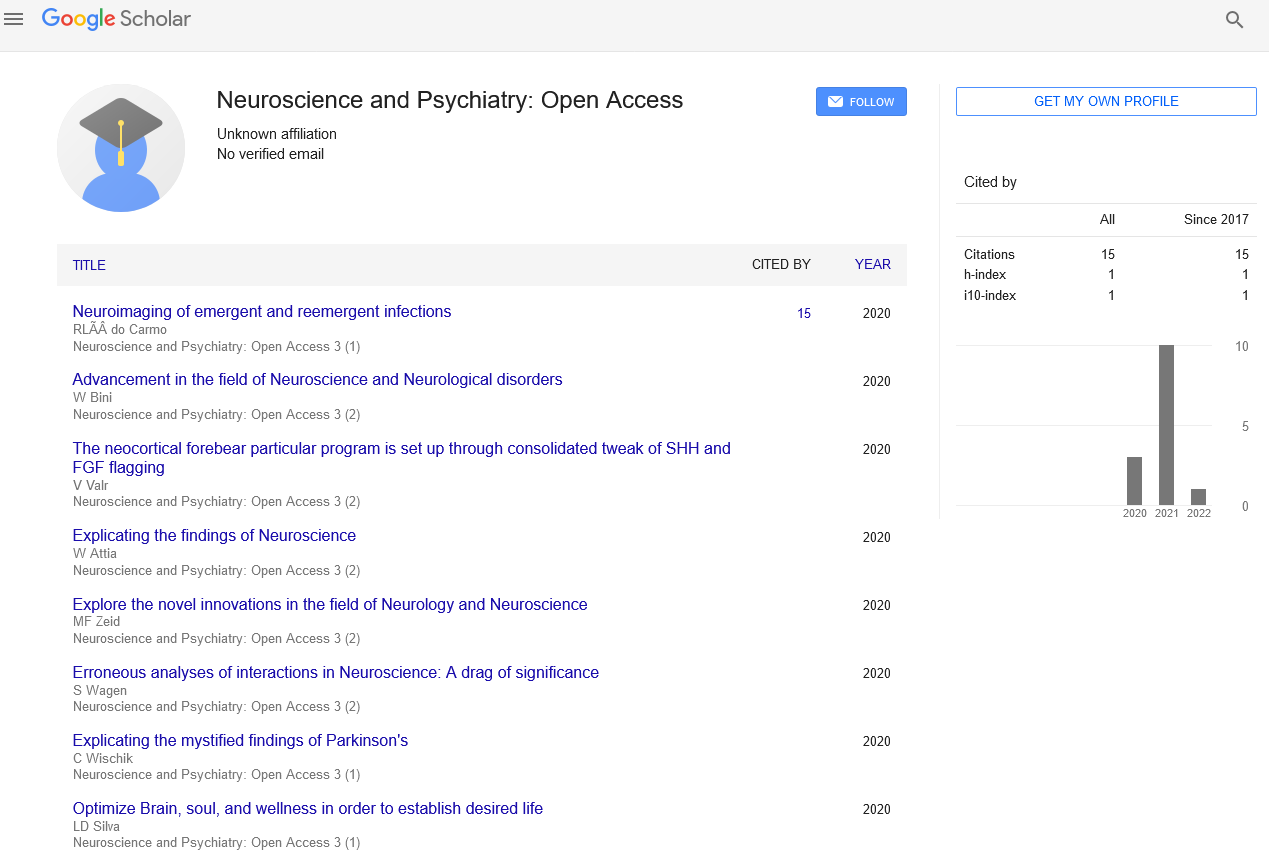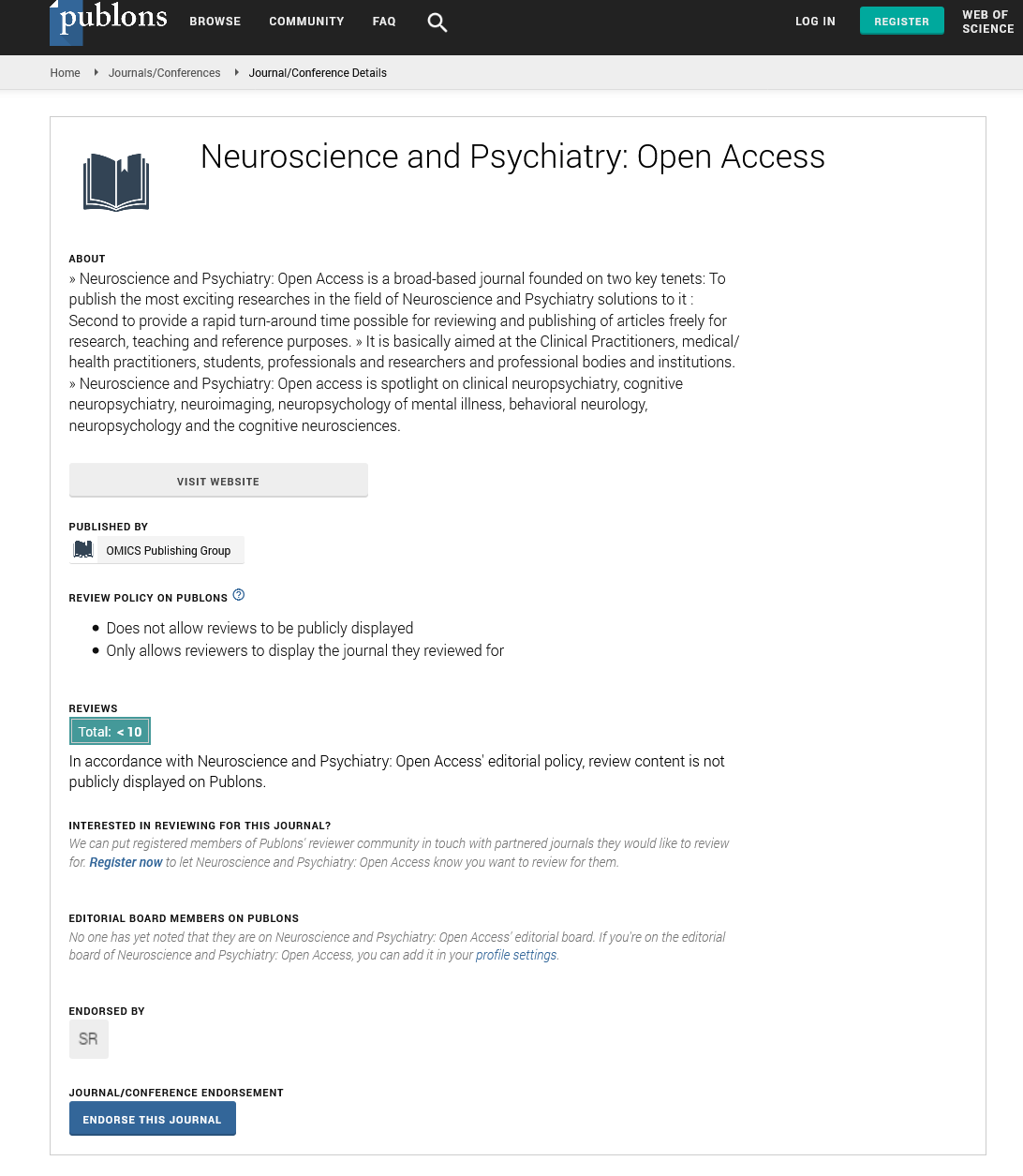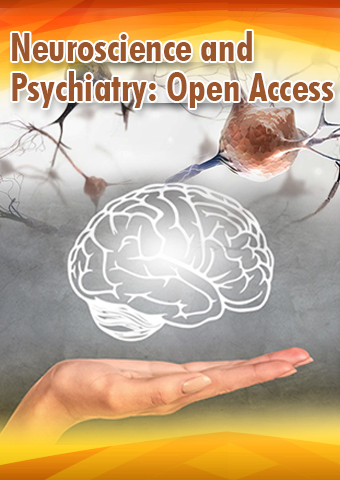Editorial - Neuroscience and Psychiatry: Open Access (2023) Volume 6, Issue 4
Decoding the Genetic Roots of Mental Disorders: Unraveling the Enigma of Psychiatric Genetics
Bruno Lee*
Department of neuroscience, College of Nursing University of Australia
Department of neuroscience, College of Nursing University of Australia
E-mail: brunol@gmail.co.in
Received: 01-08-2023, Manuscript No. npoa-23-109731; Editor assigned: 04-08-2023, Pre QC No. npoa-23- 109731; Reviewed: 18-08-2023, QC No. npoa-23-109731; Revised: 25-08-2023, Manuscript No. npoa-23- 109731 (R); Published: 31-08-2023, DOI: 10.37532/npoa.2023.6(4).89-91
Abstract
Millions of people worldwide suffer from psychiatric diseases such as depression, schizophrenia, bipolar disorder, and anxiety, posing a serious public health burden. Understanding the genetic basis of these complicated and chronic illnesses is critical for progress in mental health care. The goal of psychiatric genetics, a growing subject, is to unravel the genetic foundations of mental diseases by exploring the interactions of genetic, environmental, and developmental factors. This article presents an overview of the current state of psychiatric genetics research, including advances in genomic technologies, the biological basis of mental diseases, and research hurdles. Genomic methods, such as genome-wide association studies (GWAS) and whole-genome sequencing, have allowed for the identification of genetic variations linked to certain psychiatric diseases, revealing information on the biology underlying these disorders. The intricacies of polygenic inheritance and gene-environment interactions make identifying causal genes difficult. Ethical concerns around genetic research in psychiatry are also addressed. Despite these obstacles, psychiatric genetics presents the potential of personalised psychiatry, in which genetic screening may inform treatment decisions, allowing for specific interventions for people suffering from mental diseases. As the area evolves, it is at the vanguard of altering mental health treatment, bringing hope for improved prevention, early intervention, and focused therapy, while emphasising researchers' and clinicians' ethical responsibilities to defend patients' rights and well-being.
Keywords
Psychiatric disorders • Mental disorders • Mental health • Genetics • Genomics • Psychiatric genetics • Whole-genome sequencing • Polygenic inheritance • Gene-environment interactions • Biological basis • Neurotransmission • Brain circuitry • Personalized psychiatry • Genetic profiling
Introduction
Mental diseases, which afflict millions of people globally, are one of the most urgent issues in global health. These illnesses have a major influence on individuals, families, and societies, ranging from the shadows of depression and anxiety to the intricacies of schizophrenia and bipolar disorder [1]. For ages, the roots of mental diseases have been veiled in the enigma of the human mind. However, with the advancement of revolutionary research in psychiatric genetics, a new path of investigation has opened, promising to uncover the genetic foundations of mental diseases [2]. Psychiatric genetics is the study of the complex interplay of hereditary and environmental factors that contribute to the origin and progression of mental diseases [3]. Researchers in this multidisciplinary discipline investigate the genetic architecture of psychiatric diseases with the goal of identifying genetic variations related with specific disorders [4]. Scientists are gradually unravelling the intricate web of genetic influences that affect our mental wellbeing using modern genomic technology and rigorous statistical studies [5]. This article goes into the present status of psychiatric genetics research, breakthroughs in genomic technologies, and the biological basis of mental illnesses as we continue on the journey of decoding the genetic underpinnings of mental disorders [6]. We investigate the intricacies of polygenic inheritance and gene-environment interactions, which call into question established ideas of mental health causality [7]. We also look at the ethical issues surrounding genetic research, emphasising the significance of privacy, informed permission, and responsible use of genetic data. Furthermore, this investigation demonstrates the revolutionary power of psychiatric genetics in transforming mental health care [8]. Personalised psychiatry emerges as a novel technique that could open the way for personalised therapies and focused interventions by revealing genetic predispositions to specific mental diseases. The promise of early diagnosis and prevention heralds a new age in mental health care, one in which one-size-fits-all solutions are abandoned in favour of individual heterogeneity [9]. The quest to solve the genetic puzzle of mental diseases is a collaborative effort involving geneticists, psychiatrists, psychologists, and bioinformaticians. This article calls for an empathetic and compassionate approach to mental health care as we appreciate the complexities of the human mind. We recognise the immensity of the unknown and the challenges that lay ahead as we enter the area of psychiatric genetics. Nonetheless, the knowledge gained from this research offers hope and promise to millions of people plagued by mental illnesses [10]. By solving the mystery of psychiatric genetics, we hope to usher in a new era of mental health treatment that is based on research, empathy, and personalised interventions, ushering in a brighter and more compassionate era for those living with mental illness.
Psychiatric disorders' complex genetic landscape: Psychiatric illnesses are multifaceted in nature, with genetic, environmental, and developmental variables all playing a role. While environmental stressors and life experiences play a role in the genesis and course of mental diseases, there is growing evidence that a hereditary component is important. Individuals with affected relatives have a higher likelihood of having a psychiatric condition, demonstrating the involvement of hereditary factors, according to family, twin, and adoption studies.The genetic foundation of psychiatric diseases, on the other hand, is far from clear. Unlike single-gene illnesses, psychiatric problems result through the interplay of numerous genes, each of which has a minor effect. These genetic factors are frequently polygenic, which means they involve a large number of genetic variations spread throughout the genome.
Technological advances in genomic technologies: The introduction of genomic technologies like genome-wide association studies (GWAS) and whole-genome sequencing has transformed the study of mental genetics.
GWAS allows researchers to scan the whole genome of thousands of people in order to uncover genetic markers linked to specific psychiatric diseases. Scientists have uncovered multiple genetic variations associated to illnesses such as schizophrenia, depression, and bipolar disorder through large-scale collaborations and data sharing. Furthermore, whole-genome sequencing allows for the investigation of a person's full genetic code, offering a more thorough picture of genetic variants and rare mutations that may contribute to mental diseases. These technologies have resulted in the identification of new risk genes and molecular pathways involved in psychiatric diseases, offering information on their underlying biology.
Understanding the biological foundation: Psychiatric genetics has given us significant insights into the molecular underpinnings of mental illnesses. Genetic research has revealed the involvement of genes involved in neurotransmission, synapse function, and immunological response, among other things. These findings suggest that disturbances in neuronal transmission and brain circuitry may play a role in mental disorders. Furthermore, psychiatric genetics has identified shared genetic risk across several disorders, implying that some genetic factors may predispose individuals to a variety of mental illnesses. Some genes discovered in GWAS investigations, for example, are linked to both schizophrenia and bipolar disorder, blurring the lines between established diagnostic classifications and emphasising the importance of a multidimensional approach to understanding mental health.
Conclusion
Psychiatric genetics has emerged as a potential sector in the search of understanding mental diseases, providing a look into the intricate interplay of genetic and environmental factors that underpin these puzzling conditions. Researchers have made tremendous progress in discovering genetic markers related with numerous psychiatric diseases, offering light on their biological foundation and probable paths of malfunction. The genetic foundations of mental diseases, on the other hand, remain intricate and varied, with polygenic inheritance and gene-environment interactions posing considerable hurdles in identifying causative genes. The advances in psychiatric genetics have far-reaching consequences for mental health care. As our understanding grows, personalised psychiatry emerges, in which genetic screening may help forecast an individual's risk for specific diseases and inform treatment decisions. This personalised strategy has the potential to improve treatment response and adapt interventions, hence opening up new options for prevention and early intervention. Nonetheless, in the midst of the thrill of scientific development, ethical issues serve as a compass. Researchers and doctors must take great care to protect study participants' privacy and well-being, as well as to ensure that genetic information is handled responsibly and with the utmost respect for individuals' autonomy. Psychiatric genetics invites us to approach mental health with empathy, humility, and a desire to improve the lives of people affected by recognising the intricacies of the human mind. As we unravel the genetic puzzle, we are poised to usher in a new era of mental health care, one that is tailored to the individual, compassionate in its approach, and founded on the fundamental understanding that the roots of mental disorders lie at the crossroads of nature and nurture.
References
- Roberts CK, Won D, Pruthi S et al. Effect of a short-term diet and exercise intervention on oxidative stress, inflammation, MMP-9, and monocyte chemotactic activity in men with metabolic syndrome factors. J Appl Physiol. 100, 1657-65 (2006).
- Kobayashi H. Airway biofilms: implications for pathogenesis and therapy of respiratory tract infections. Respiratory medicine. 4, 241-253 (2005).
- Makam AN, Nguyen OK. An Evidence-Based Medicine Approach to Antihyperglycemic Therapy in Diabetes Mellitus to Overcome Overtreatment. Circulation. 135, 180-195 (2017).
- Qaseem A, Vijan S, Snow V et al. Glycaemic control and type 2 diabetes mellitus: the optimal haemoglobin A1C targets, a guidance statement from the American College of Physicians. Annals of Internal Medicine. 147, 417-422 (2007).
- Bick David, Bick Sarah L, Dimmock David P et al. An online compendium of treatable genetic disorders. American Journal of Medical Genetics. Part C, Seminars in Medical Genetics. 187, 48-54 (2021).
- Jones G, Steketee RW, Black RE et al. How many child deaths can we prevent this year? Lancet. 362, 65-71 (2003).
- Vukasinovic.Real Life impact of anesthesia strategy for mechanical thrombectomy on the delay, recanalization and outcome in acute ischemic stroke patients. J Neuroradiol. 95, 391-392 (2019).
- Salinet ASM. Do acute stroke patients develop hypocapnia? A systematic review and meta-analysis. J Neurol Sci. 15, 1005-1010 (2019).
- Headey DD, Chiu A, Kadiyala S. Agriculture's role in the Indian enigma: help or hindrance to the crisis of undernutrition? Food security. 4, 87-102 (2012).
- Dora, Veronica Della. Infrasecular geographies: Making, unmaking and remaking sacred space. Prog Hum Geogr. 42, 44-71 (2018).
Indexed at, Google Scholar, Cross ref
Indexed at, Google Scholar, Crossref
Indexed at, Google Scholar, Cross ref
Indexed at, Google Scholar, Cross ref
Indexed at, Google Scholar, Crossref
Indexed at, Google Scholar, Crossref
Indexed at, Google Scholar, Crossref
Indexed at, Google Scholar, Crossref
Indexed at, Google Scholar, Crossref


